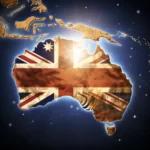Despite what the cynics and activists might say, Australia is a nation worth celebrating — and the 26th of January is the best day to celebrate it.
Efforts to problematise Australia Day began early this year.
First we saw the High Commissioner cancel Australia Day celebrations in London. Then 80 councils around the country scrapped their Australia Day citizenship ceremonies. More recently, Woolworths told customers they will no longer stock Australia Day merchandise.
No doubt we will see more such campaigns before the 26th of January rolls around.
So why don’t we change the date — or stop celebrating Australia Day altogether?
I can think of at least 10 reasons.
1. Australia is a Nation Worth Celebrating
Before we consider the date of Australia Day, let’s first establish that Australia is a nation worth celebrating.
In a world wracked by strife, Australia remains one of the freest, most prosperous and harmonious multi-ethnic societies that has ever existed. It is easy to see why people from all around the world have flocked to our shores for generations.
Australia consistently ranks high in global quality-of-life indices, whether in healthcare, education, standards of living or overall wellbeing. We have a highly skilled workforce, a proud history of democracy, and we enjoy stable government.
Australians are known worldwide for their friendliness, sense of humour and mateship. The Australian way of life is the envy of the world, thanks to our advantageous climate, low population density, ready access to the coast, and famously laid-back lifestyle.
We are surrounded by breathtaking natural beauty: iconic outback landscapes, tropical beaches, marine reserves, rolling wine country, lush rainforests, and vibrant cities, not to mention extraordinary wildlife found nowhere else on earth.
Anyone can criticise Australia for its failings or lament that our nation’s benefits are not equally enjoyed by its people. It is easy enough to imagine countries that are more fair or just — but nearly impossible to find them.
Until utopia is achievable (hint: it isn’t), Australia remains a reasonably close second — and that’s worth celebrating.
2. Celebrating Australia Day Fortifies National Unity
Despite the claim, common today, that “diversity is our strength”, what actually holds the people of a nation together is not what makes them different, but what they share in common despite their differences.
There are plenty of days set aside for subcultures within our country to celebrate what sets them apart from other Australians. Australia Day is one of the only — perhaps the only — opportunity each year for 25 million of us to reflect on, appreciate and celebrate our commonalities as Australians.
A nation can only endure if it continues to value its shared history, appreciate those who founded and fought for it, nurture civic participation, and foster a healthy love of country.
Conversely, the fastest way to undermine a nation and see its society unravel would be to convince its people that their country is corrupt, inhumane, shameful and unjust. That is precisely the message being preached by anti-Australia Day activists. And it’s why their message should be ignored.
Aboriginal elder and pastor James Dargin used to hold that view too, but not anymore. While acknowledging the many sins in Australia’s history, he believes we must let our national holiday bring us together:
3. It’s a Day to Honour Aboriginal Australians
If Australia Day is a celebration of our shared history and a chance to appreciate those who built our nation, then we would be dishonouring Aboriginal Australians if we abolished our national holiday, since Aboriginal people helped build this country.
Countless examples could be cited, but none so significant as the thousands of Indigenous servicemen who fought in wars to defend their homeland.
During the First World War, 1,200 Indigenous men served under Australia’s Southern Cross Flag. Another 3,000 Indigenous men fought to defend Australia in the Second World War, many of them now buried on foreign soil. Up to 300 Indigenous soldiers served in Vietnam, with many paying the ultimate price in service for their country.
As my friend Warwick Marsh has argued, abandoning Australia Day means scorning the sacrifice of so many Aboriginal Australians and defaming the nation for which they died. Instead, let’s value their sacrifice on our national day.
4. There Are Other Days Set Aside for Mourning
Some have suggested that the 26th of January should remain the date of our national holiday but that it should instead be used for national mourning and reflection.
In this view, Governor Philip’s hoisting of the Union Jack in Sydney Cove and his declaration of a new British colony was an act of hostility and war — making ‘Invasion Day’ or ‘Survival Day’ more suitable names for the 26th of January.
A milder version of this, put forward by Christian leaders such as John Dickson, contends that if Australia Day remains as it is, we should use the day to lament before we rejoice.
Here’s why I disagree: On our national calendar, there are many days already set aside to mourn the injustices committed against Indigenous Australians, including:
13 February | Anniversary of the National Apology
21 March | National Close the Gap Day
21 March | Harmony Day
26 May | National Sorry Day
27 May | Anniversary of the 1967 Referendum
27 May — 3 June | Reconciliation Week
3 June | Mabo Day
1 July | Coming of the Light
7–14 July | NAIDOC Week
4 August | National Aboriginal and Torres Strait Islander Children’s Day
9 August | International Day of the World’s Indigenous Peoples
7 September | Indigenous Literacy Day
13 September | Anniversary of the UN Declaration on the Rights of Indigenous People
The faults and failures of British colonialism are now a significant theme on many of these dates — on National Sorry Day especially. That being so, Australia Day deserves its place on our national calendar, not as a day of mourning at all, but as a day of celebration and rejoicing over our great country and our shared Australian identity.
5. Changing the Date Won’t Fix Indigenous Disadvantage
All Australians should share a concern for the needs and hardships of Indigenous Australians living in rural and remote communities. The “gap” is real and needs to be addressed. But I believe it is misguided to conflate compassion for Indigenous disadvantage with anti-Australia Day activism.
Aboriginal leaders like Senator Jacinta Nampijinpa Price and Dr Anthony Dillon of Australian Catholic University have stated the obvious on this matter: Changing the date will do precious little to fix Indigenous disadvantage.
Speaking on a podcast several years back, Senator Price argued that changing the date “isn’t going to make any significant impact whatsoever on the ground for the most marginalised”. She explained:
I’ve got Aboriginal women coming to me saying, “This is ridiculous. I’ve been a victim of domestic and family violence and sexual abuse as a child.” For these privileged people to be banging on about changing the date of Australia Day as if this is the most important issue disgusts me as it’s drowning out the voices of those who are actual real victims.
Senator Price has even suggested that anti-Australia Day activism is “a complete copout and pretend way to act like you actually care for Aboriginal people”.
Writing for The Australian just last week, Anthony Dillon debunked the idea that Australia Day causes emotional distress for Aboriginal people with the simple fact that “many, many Aboriginal people celebrate Australia Day”.
“Many may claim they suffer on that day because of historical events, but this is simply a charade,” he wrote. “It’s a way to gain attention and pity or to have a convenient excuse for when life does not go as smoothly as one would like.” Dillon then added:
For those who claim to oppose Australia Day on the basis that it is somehow distressing to Aboriginal Australians, I have some advice. Try sparing a thought for those many Aboriginal people genuinely suffering because they are hungry, live in unclean environments, share a mattress with three others and two dogs, and are so used to violence they no longer notice it.
Far better would be “a message that inspires us to focus on practical strategies that will close the gap,” he concludes.
6. Anti-Australia Day Activists Cannot Be Appeased
The campaign against Australia Day comes from the left or “progressive” fringe of politics, which has a long and decorated history of making radical ideas seem socially acceptable.
It takes strategy and patience for radical activists to move the Overton Window in their direction, but they have proved successful at it time and time again — whether on abortion, euthanasia, same-sex marriage, transgenderism or racial essentialism.
In truth, it is a futile task trying to find a middle ground with radical activists, since their modus operandi is to use any territory they gain for their next territorial advance.
We have seen this already with Australia Day. First came the appeal to lament our national holiday by rebadging it ‘Invasion Day’ or ‘Survival Day’. Then came demands to change the date, followed by calls to abolish Australia Day altogether. It won’t stop there, either.
It is important to understand that, while the anti-Australia Day movement might feel homegrown, it is a vital branch of a radical global movement best described as Western Marxism.
Western Marxism views Western Civilisation in general — and Christianity in particular — as problematic and “oppressive”. It seeks to stir up division and hostility among the “oppressed” (in this case, Indigenous people) and use them to overthrow society as we know it, ultimately replacing it with a new, revolutionary society.
Appeasement is a doomed endeavour, precisely because anti-Australia Day activists are not looking for a solution — they are looking for a problem. Their end goal is not to abolish Australia’s national holiday but to abolish Australia in its current form (or “decolonise” it). They have said so themselves.
(If you’re still not convinced, find me all the non-Indigenous activists who have “paid the rent”, handed back their “stolen land” to Indigenous Australians, packed up their things, and returned to Britain).
7. Most Australians Want to Keep Australia Day As It Is
For further proof that anti-Australia Day activism comes from the radical fringe, consider that the fake news media continues to promote the cause despite its persistent lack of popularity among Australians.
The Institute of Public Affairs conducts regular polling on this question. In the IPA’s 2022 poll, 65% of Australians expressed support for Australia Day being celebrated on the 26th of January, and only 15% said the date should be changed. Additionally, 84% of respondents said they were proud to be Australian, while only 5% disagreed.
Two years later, even after relentless media and activist attacks on Australia Day, the results have barely budged.
In its 2024 poll, the IPA found that 63% of Australians still support celebrating Australia Day on the 26th of January, while 17% disagreed. Meanwhile, patriotic sentiment has risen: 87% of those polled said they were proud to be Australian, and just 4% disagreed.
Radical agendas might be growing in popularity among the world’s elite — a fact that was exposed for all to see during the Voice to Parliament debate. But the historic defeat of that referendum also showed that radicalism is deeply unpopular among everyday Australians.
8. 26th of January Celebrations Have a Long History
An argument commonly heard in Australia Day debates is that the 26th of January only became a nationwide public holiday in 1994. However, this deceitfully-worded claim obscures the long history of Australia Day.
In the early 19th century, the name “Australia” had not yet come into common use, so we can hardly expect that the 26th of January was known as “Australia Day” back then. Instead, in that era, it was called “Foundation Day” and was celebrated for the founding of the British Colony of New South Wales — the only British colony that yet existed on New Holland.
As early as 1808, the colony’s immigrants —and especially emancipated convicts — were observing the 26th of January with “drinking and merriment” to “celebrate their love of the land they lived in”. Successful colonists began holding anniversary dinners on this date, with one such event being documented in the Sydney Gazette in 1817.
The year 1818 marked the 30th anniversary of the First Fleet’s arrival in Sydney Cove, prompting Governor Lachlan Macquarie to put an official stamp on the 26th of January celebrations. This included a holiday for all government workers, an extra allowance of fresh meat, and a 30-gun salute at Dawes Point — traditions that were continued by subsequent governors.
Soon, sporting events also became associated with the 26th of January, including what would ultimately become the Australia Day Regatta in Sydney Harbour, held for the first time in 1837.
The following year was the 50th anniversary of the colony. As part of the celebrations, the 26th of January was declared as Australia’s first public holiday. The Regatta was held again, this time with crowds dotting the Harbour’s foreshores. A 50-gun salute was staged at Dawes Battery, the Royal Standard was hoisted, and at night, rockets and fireworks lit up the Sydney sky.
In 1888, when the 100th anniversary rolled around, every colonial capital in Australia except Adelaide celebrated the 26th of January as “Anniversary Day”.
In 1901, the colonies federated to become the Commonwealth of Australia. The idea of celebrating a national holiday called “Australia Day” took a while to catch on, but by 1935, all of the states were celebrating the 26th of January as Australia Day.
In 1938, on Australia’s 150th anniversary, the day was proclaimed an official holiday, and in 1988, on the 200th anniversary, it became a national public holiday.
So, what about the year 1994? That was when the parts of the country that had been celebrating Australia Day on the closest Monday to the 26th of January agreed to observe the holiday on the actual date.
Don’t believe the naysayers. The 26th of January has been associated with Australia’s founding and nationhood from the earliest of days.
9. We All Became Citizens on the 26th of January
The 26th of January is significant for an additional reason: It was the day, in 1949, that Australian nationality came into existence. Before that time, all inhabitants of Australia (including all Aboriginal Australians born after 1921) were British subjects with British passports and an obligation to fight in British wars.
However, when the Nationality and Citizenship Act came into effect on the 26th of January, 1949, all of us — non-Indigenous and Indigenous — officially became Australian citizens.
It is also for this reason that citizenship ceremonies have long been held on Australia Day — a day when immigrants who have chosen to call Australia home celebrate their newly conferred Australian identity and make the following pledge:
From this time forward, under God, I pledge my loyalty to Australia and its people, whose democratic beliefs I share, whose rights and liberties I respect, and whose laws I will uphold and obey.
We all became Australians on the same day, which is another reason why Australia Day should continue to be celebrated on the 26th of January.
10. Colonisation Was Good for Indigenous Australians
During the national debate over the Voice to Parliament, Senator Jacinta Nampijinpa Price gave a speech at the National Press Club, where she was asked if colonisation continues to have an impact on Indigenous Australians.
“A positive impact? Absolutely,” was her reply. “I mean, now we’ve got running water, we’ve got readily available food.”
More than just a quick-thinking rebuttal, Senator Price’s answer underscored an obvious reality that many Australians have been fooled into forgetting.
Yes: British colonisation was the cause of immense pain and injustice to early generations of Aboriginal and Torres Strait Islander people. The dispossession, disease, massacres and discrimination inflicted on Indigenous communities are rightly known as the darkest chapter in Australia’s history. One would be hard-pressed to find an Australian who disagrees.
However, colonisation ultimately brought incalculable benefits to Aboriginal people too — including human rights; the rule of law; modern medicine, science and technology; roads, bridges and other infrastructure; literacy and education; improved agriculture and nutrition; advanced industry, opportunities for employment and upward mobility; vastly longer lifespans and increased standards of living; and contact with other cultures’ perspectives, philosophies, art, sport, leisure activities and more.
Most important of all, Aboriginal and Torres Strait Islanders heard the good news of Jesus Christ, and still today, a high proportion of Indigenous Australians treasure their Christian faith and are deeply grateful the gospel came to their shores.
Does every Australian fully enjoy the benefits of colonisation? Is life for all Indigenous Australians the best it can be? The answer to these questions is obviously no. But to decry colonisation for its misdeeds while ignoring its countless blessings is both foolish and deeply dishonest. Letting the perfect be the enemy of the good is the oldest mistake in the book.
So while the cynics keep calling for a change of date for Australia Day, or for the national holiday to be abolished altogether, Australians with common sense — from every ethnic background — will see through the flawed logic, misguided empathy, selective amnesia and naked activism.
And we will continue celebrating Australia for the great nation that it is, even as we seek to make it a better place for everyone.
___
Image courtesy of the Institute of Public Affairs.











